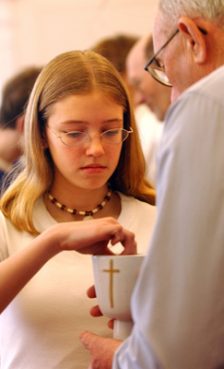
Some churches are modifying their worship practices, including a shared Communion chalice or hugs and handshakes at the sign of peace, in an effort to stem the spread of swine flu. Religion News Service file photo by Lynn Ischay.
WASHINGTON (RNS) The White House and federal health officials have released guidelines recommending that worshippers take precautions against spreading germs to reduce the risk of contracting swine flu.
Marilyn Meyers, a 67-year-old member of Washington National Cathedral, already had thought about the health risks involved in her church’s services. On Sunday (Oct. 4), as she has for the past several months, she rubbed sanitizer on her hands before getting in line for Holy Communion.
“You shake hands, you touch the prayer books we all share, you break off a piece of the same bread — who knows what might be on it?” she said.
At Sunday’s service, parishioners continued to exchange the Sign of Peace, shaking hands with those around them. Most also waited in line to receive Communion, often sipping from a communal chalice.
“I’m not concerned about the wine yet,” said Meyers. “But if I were, you’re allowed to dunk the wafer in, so you aren’t sipping from the same cup. I think I’m OK for now, though.”
The guide, which was released Friday by the White House Office for Faith-based and Neighborhood Partnerships and the Department of Health and Human Services, advises religious groups to take precautions to help prevent the spread of swine flu.
The guide suggests that houses of worship encourage congregants to wash their hands often, use hand sanitizer, avoid crowded situations and interact without physical contact when possible. It also urges religious leaders to keep in contact with local health organizations and closely adhere to their recommendations.
Joshua DuBois, the director of the faith-based office, said in a news release that faith leaders have significant power to help spread the word on how to stay healthy.
The National Association of Evangelicals, too, e-mailed its member congregations on Monday to suggest preparations for flu season by following the White House guide, which can be found online at http://www.flu.gov.
The U.S. Conference of Catholic Bishops recommends that clergy remind parishioners not to drink from the Communion cup if they are feeling ill. The conference also said bishops are free to make decisions for their specific dioceses.
Already, Bishop John F. Kinney of St. Cloud, Minn., directed churches in his diocese to stop offering a common Communion cup and to discourage hand contact during Mass.
In the Washington area, Catholic leaders said they were taking their cues from the Archdiocese of Washington and the bishops’ conference.
The archdiocese is distributing recommendations from the Centers for Disease Control and Prevention, and reminding parishioners that they can nod rather than shake hands for the Sign of Peace, according to archdiocese spokeswoman Susan Gibbs.
The federal guidelines also are relevant to Islam. Some Muslims ritually cleanse themselves using the same bowl of water before they are called to prayer. And in the Jewish tradition, congregants close the service by shaking hands and wishing each other a good Sabbath, or “Shabbat shalom.”
The Very Rev. Samuel T. Lloyd III, dean of the Washington National Cathedral, said he was in close communication with local health authorities, and would take action as needed. But he thought it wasn’t up to the Episcopal Church as a whole to dictate how to practice rituals.
“We are prepared to take action if there is a concern, but in the end, people should make their own decisions,” he said.
Meyers agreed that precautions aren’t up to the government, or the clergy.
“I think it’s something that’s up to the individual,” she said, “No one can make the decision for you or tell you how to practice your faith.”




